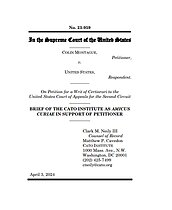Learn more about Cato’s Amicus Briefs Program.
The federal government charged Petitioner Colin Montague with a variety of drug offenses, including leading a continuing criminal enterprise (“CCE”). The indictment alleged only that he engaged “in a [CCE] in that he did violate” certain federal statutes, “which violations were part of a continuing series of violations.” The indictment did not allege the facts or circumstances of any CCE predicate offenses.
Mr. Montague filed a motion to dismiss the CCE charge, in part on the ground that the Fifth Amendment requires that CCE indictments spell out specific predicate‐offense violations. The district court denied the motion. At Mr. Montague’s trial, the district court instructed the jury that the predicate violations “may even be acts not mentioned in the indictment at all.” Mr. Montague was convicted and sentenced to life imprisonment. The Second Circuit affirmed. Judge Jacobs dissented, arguing that the Fifth Amendment is no “fussy rule of pleading or bureaucratic speed bump,” but a “substantial safeguard against oppressive and arbitrary proceedings.” The Second Circuit denied rehearing en banc; five judges dissented and called for Supreme Court intervention.
Cato filed an amicus brief asking the Supreme Court to grant certiorari and reverse the Second Circuit’s decision. The Founders painstakingly designed the grand jury system as a crucial protection for accused Americans. The Fifth Amendment’s Grand Jury Clause reinforces the Due Process Clause in checking government power. The grand jury’s constitutional role is even more important in our modern, system which is regrettably driven by pleas and not trials. The criminal justice system can ill afford to have the institution of the grand jury further weakened, and this case presents an apt and timely vehicle for the Court to emphasize the constitutional commitment to an “independent and informed grand jury.”
The Emory Law School Supreme Court Advocacy Program (ELSSCAP) assisted the Cato Institute in preparing this amicus brief. The ELSSCAP members involved in preparing this brief were Clay Marsh, Kylie Doyle, Jane Onuoha, Peng Shao, Jacopo Capparelli, Rebecca Weisberger, Brandon Sasserson, and Sruthi Naveetha.

This work is licensed under a Creative Commons Attribution-NonCommercial-ShareAlike 4.0 International License.

